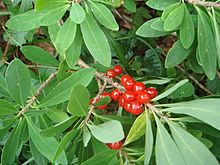Lark Wood facts for kids
| Site of Special Scientific Interest | |

Example - Mezereum (Daphne mezereum)
|
|
| Area of Search | Gloucestershire |
|---|---|
| Coordinates | 51°56′05″N 1°50′58″W / 51.934663°N 1.849413°W |
| Interest | Biological |
| Area | 1.11 hectare |
| Notification | 1974 |
Lark Wood is a special natural area in Gloucestershire, England. It covers about 1.11 hectares, which is like two football fields. This area was officially recognized in 1974 because of its important plants and animals. It's called a Site of Special Scientific Interest (SSSI). It's also known as a Key Wildlife Site (KWS) in the Cotswold District, meaning it's a very important place for local wildlife.
Contents
What is Lark Wood Like?
Lark Wood is located in the north-east part of the Cotswolds. It's a small forest filled with trees that lose their leaves in autumn. This type of forest is called a deciduous woodland.
Trees and Plants
The forest grows on limestone rock from the Jurassic period. Most of the trees here are Oaks. You can also find some Beech trees and Sycamores.
Below the taller trees, there are many shrubs. These include Hazel and Hawthorn. On the ground, you'll mostly see Brambles, Dog's Mercury, and Woodruff.
Forest Management
The forest is managed using a method called "coppice-with-standards." This means some trees are cut back regularly to encourage new growth. Other taller, stronger trees are left to grow big and tall. This helps keep the forest healthy and diverse.
Special Plants of Lark Wood
Lark Wood was chosen as an SSSI because it used to have a large number of a very rare plant called Mezereon. This plant is not common in the country.
Other Rare Plants
Besides Mezereon, other unusual plants found here include a type of Spurge and Butcher's Broom. These plants add to the special nature of Lark Wood.
Changes Over Time
A report from Natural England in 2012 stated that the Mezereon plant could no longer be found in Lark Wood. Its numbers had been going down for several years. Experts now believe that the area is no longer suitable for this plant to grow.
Because of this, there's a suggestion to remove Lark Wood's SSSI status. This means it might no longer be officially recognized as a Site of Special Scientific Interest.

